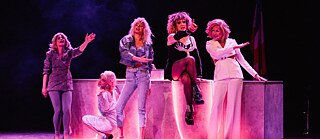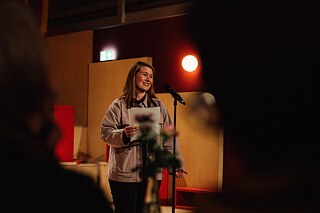New Stages South East
Something lasting

Europe is a complex mosaic nowadays with war and crisis, cracks and cohesion. In recent years, young authors from Southeastern Europe have written texts for a theatre of the future as part of the project “New Stages South East”. In early 2023, Theater Oberhausen presented eleven of these texts at a festival. We spoke to Laura Mangels, dramatologist and artistic director of the festival at Theater Oberhausen.
By Alexander Behrmann
What was the motivation for your theatre organisation of bringing the project “New Stages South East” from Southeastern Europe to Oberhausen?
Laura Mangels: At Theater Oberhausen, under the directorship of Kathrin Mädler, we place a strong emphasis on contemporary drama. What interested us about “New Stages South East” was that the political impact of theatre was taken seriously and that linguistic and cultural barriers were overcome in the field of drama. The writing workshops, which lasted several months, led to the creation of texts which engage with the existential questions of our time. These texts somewhat counteract the complex web of crises and use very different approaches in terms of content and form. And they are texts which demand to be on stage! Oberhausen is also a very diverse city in the Ruhr region. There are lots of people living here whose story is closely connected with Southeastern Europe. We immediately decided that we wanted to give visibility to the texts created as part of “New Stages South East” in the context of a festival and to discover new authors who have previously not been seen in the German-language theatre landscape together with our audience.
What was your experience of the cooperation like?
A total of 33 texts were created as part of the writing workshops in the region, which lasted several months and were led by international and German mentors. In Oberhausen, following the workshops hosted by the Goethe-Institut, we created a panel session to give a total of five texts particular visibility. Since the texts were so different and so good, during the festival we presented a total of eleven texts as workshop performances, scenic readings or installations. The presentation of the works was enhanced by guest performances from Serbia, Romania and Germany. There was a concert by Bulgarian Cartrader, various discourse formats on the theatre landscape in Southeastern Europe, on the relationship between theatre and politics and, of course, parties. Lots of the authors attended the festival in Oberhausen as guests, artists in the guest performances, students at the Folkwang University of the Arts, who expanded our ensemble, and directors such Magdalena Schönfeld, Katerina Giannopoulou or Niko Eleftheriadis, who were involved in the artistic interpretation of the texts.
The festival days were very different and I got the impression that something long-lasting was created over those four days. New connections that will continue to shape the theatre landscape. We are particularly pleased that our cooperation with the authors is continuing. Our theatre is performing “Sauer” by Asja Krsmanović, directed by Niko Eleftheriadis, for the first time. At the same time, the Nationaltheater Mannheim is home to the first German-language production of “Generation Lost” by Greg Liakopoulos. Then our artistic director, Kathrin Mädler is bringing to life Dario Bevanda’s text “Darkness on the Edge of Town” at the National Theatre in Sofia. And this means the texts will keep spreading, hopefully all over Europe.
To what extent do artists’ origin and background affect their work and theatre productions?
Naturally, an author’s individual background and perspectives influence their texts. However, if you try to manifest what topic will come up in a text on the basis of a specific background, you are quite likely to reach the limits of your own imagination. However, there are threads which link multiple texts together: the deconstruction of gender roles or queer empowerment moments which process a patriarchal society often shaped by Orthodox traditions; family in general as a core place and breeding ground of pain and cohesion and, naturally, memories of war and ethnic conflicts in the region which are still present and which have become part of a brutally changing present again due to the war caused by Russia’s attack on Ukraine.
To what extent can German theatres benefit from cooperation with artists from other countries and cultures?
Art is always an exchange of thoughts, ideas, signs. Therefore, I believe that theatre does not just benefit from cooperation with arts from other countries but that it is precisely this collaboration that has always kept theatre alive. In this regard, the work of the Goethe-Institut is unbelievably important for the landscape of German-language theatre and festivals, both for mobility to other countries and for inviting artists from all over the world or initiating projects such as “New Stages South East”. If opportunities for international collaboration disappear, this will be damaging to the art and its democratic and participative power. In theatre, there is also often a language barrier associated with the focused work on language in an international context. Here too, the Goethe-Institut is an important partner for facilitating fruitful collaboration.

Laura Mangels is dramatologist and artistic director of the festival at Theater Oberhausen. | © Lukas Diller
“New Stages South East” is a multi-year international project by the Goethe-Institut which supports the creation of new theatre and brings together young authors and theatregoers from Southeastern Europe and Germany to share experiences of current issues and continue to develop together. Participating countries: Bosnia and Herzegovina, Bulgaria, Greece, Croatia, Romania, Republic of Moldova, Serbia and Cyprus. In the 2023/2024 and 2024/2025 seasons, premieres and first night performances took place at Theater Oberhausen, Theater Essen and Nationaltheater Mannheim.